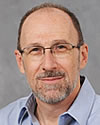 Brian Berkowitz |
2015 O.E. Meinzer Award
Presented to Brian Berkowitz
Citation by Leonard F. Konikow
Professor Brian Berkowitz has made pioneering, impactful, and diverse contributions to both theoretical and applied aspects of groundwater science. One major focus of his research has been on understanding and modeling contaminant transport and dispersion in the heterogeneous subsurface—an interest and expertise undoubtedly derived from his tutelage under Prof. Jacob Bear. His primary emphasis has been on quantifying anomalous (non-Fickian) transport. This is a thorny, non-unique, and ill-defined problem, which has occupied and perplexed the hydrogeology community for decades. Brian has introduced a new innovative approach to provide an effective framework to quantify non-Fickian transport. His introduction and adaptation of the Continuous Time Random Walk (CTRW) theory to hydrology to quantify non-Fickian transport is a tour de force. CTRW theory represents a dramatic change in paradigm and recognizes that solutes experience a distribution of times and not just lengths of transitions as they move through a porous medium. Under Brian’s leadership, “anomalous transport” is now becoming much less of an “anomaly.” Brian has advanced our conceptual understanding, developed the theory, provided the numerical tools, executed definitive laboratory experiments, and analyzed (previously inadequately quantified) laboratory and field data to quantify and predict anomalous transport in porous and fractured geological media. He has made similarly impressive theoretical and experimental advances in understanding and modeling the fate of reactive chemical species in ways that account for non-Fickian transport and its interplay with a range of geochemical processes. Brian’s research creativity and innovativeness also has a very practical side, as illustrated by his seven patents for inventions and methods that offer new approaches for preventing subsurface contamination and for cleaning up contaminated groundwater where it has already occurred.
Brian is a credit to GSA and to the science of hydrogeology. Please join me in congratulating Brian Berkowitz on receiving the 2015 O.E. Meinzer award for significantly advancing the science of hydrogeology.
 2015 O.E. Meinzer Award — Response by Brian Berkowitz
2015 O.E. Meinzer Award — Response by Brian Berkowitz
Thank you for the most generous citation and very kind words. It is indeed a great honor to be recognized with the O.E. Meinzer Award. I wish to express my sincerest gratitude to the GSA, the Hydrogeology Division, and the Meinzer Award Committee for their thoughtful consideration, as well as to the many people who supported the nomination. Receipt of this award is also deeply humbling, because I recall the great many people who have shaped my appreciation of scientific endeavor and influenced my life – both professional and personal – and are deserving of recognition and thus part of this award.
Since the days of my earliest memories, my favorite question has been “why?”. I both marveled and was frustrated at the world around me, and on a daily basis, I challenged my dear parents, Norbert and Sheila (of blessed memory) – a chemist and a bacteriologist – to explain how and why things did and did not work. My parents did a fantastic job of stimulating my imagination and answering (most of!) my questions, and imbued in me the need to challenge “conventional wisdoms” to advance science. I will forever be indebted to them for their unbounded love, deep insight and unwavering support.
After receiving excellent training in applied mathematics and petroleum engineering from the University of Alberta, Canada, I was fortunate to have the opportunity to pursue doctoral studies at the Technion, Israel with Jacob Bear. He introduced me to the science of hydrology, and set me on many paths that have driven my research, a key one being to find an alternative to the classical advection-dispersion equation which, in his words of three decades ago, “…has limitations, but then again….what other tools do we have”? Following my doctorate, I spent five years sharpening my mind dealing with real – and often exasperating – field data at the Israel Hydrological Service in Jerusalem, and then two stimulating years at the University of British Columbia interacting with Leslie Smith, before joining the Weizmann Institute of Science. The ensuing years have been spent in a scientific Garden of Eden, allowing me to expand my interests and even risk discovering that some of my modeling efforts might be wrong, by designing and performing my own experiments.
My years at Weizmann have benefited immensely from my close collaboration with many colleagues…but most notably with Harvey Scher – with whom I have worked most fruitfully and joyfully to develop CTRW methods to model anomalous transport – and more recently, with Ishai Dror, who handles all of the chemistry that my father knew I appreciate but would not learn myself!
And throughout the years, I offer my love and respect to my immediate family – my wife Melanie, and my children Noa, Sari and Yotam – for their support, humor (well, at least they laugh at all of my jokes), and inspiration, and for picking up where my parents left off, in terms of teaching me so much more about “life, the universe and everything”.
Mentoring is in many respects the most rewarding aspect of my academic career. Interactions with my students and postdocs have continually affirmed the truth of a quote from the Talmud: “I have learned much wisdom from my teachers, more from my colleagues, and the most from my students”.
To my family and all of my colleagues and co-authors around the world, I thank you. You are all a part of this award.
